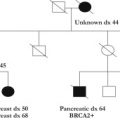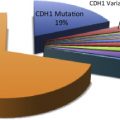The role of the cancer genetic counselor in the management of patients with cancer is discussed in this article. This includes explaining what a genetic counselor is trained to do and how they are credentialed and licensed. In addition, the article explains who to refer for cancer genetic counseling. Once referred, the article describes what actually happens in a pretest and posttest cancer genetic counseling session. Use of a cancer genetic registry and how it can help in practice is discussed. Finally, several mechanisms for identifying a cancer genetic counselor at one’s institution or nearby are outlined.
Key points
- •
The cancer genetic counselor is critical in the management of patients with cancer who may have an inherited susceptibility to cancer.
- •
Patients with cancer with an early age at diagnosis, multiple primary tumors, rare tumors, or a family history of multiple cases of the same or related cancers should be referred for cancer genetic counseling.
- •
The identification of patients with hereditary cancer susceptibility syndromes can aid in surgical decision-making.
What is genetic counseling?
The National Society of Genetic Counseling defines genetic counseling as “The process of helping people understand and adapt to the medical, psychological, and familial implications of genetic contributions to disease.” This process integrates interpretation of family and medical histories to assess the chance of disease occurrence or recurrence; education about inheritance, testing, management, prevention, resources, and research; and counseling to promote informed choices and adaptation to the risk or condition.
What is a certified genetic counselor?
A certified genetic counselor is a master’s level trained health care professional with a specialized degree in genetic counseling from an accredited genetic counseling training program that has passed the National Board Examination for Certification administered currently by the American Board of Genetic Counseling (ABGC) and previously by the American Board of Medical Genetics. At the time of this publication there are 31 accredited training programs for genetic counseling in the United Sates and three in Canada. A complete and up-to-date list is found at http://gceducation.org/Pages/Accredited-Programs.aspx . Genetic counselors are experienced in areas of medical genetics and counseling. By combining their knowledge of basic science, medical genetics, epidemiologic principles, and counseling theory with their skills in genetic risk assessment, education, interpersonal communication, and counseling, they provide services to clients and their families for a diverse set of genetic or genomic indications. Certification of genetic counselors provides assurance that the individual has met the minimum standards and competencies to practice.
Why Is Certification Important
Certification is important because it ensures a genetic counselor has graduated from an accredited genetic counseling program, which means they have met the established standards for professional practice through documentation of specialized training as required for graduation from an accredited training program, and received a passing score on the ABGC Certification Examination. Once this has been done, the Certified Genetic Counselor credential is granted by the ABGC. Genetic counselors certified before 1996 by ABGC or the American Board of Medical Genetics do not have a time-limited certification; however, voluntary recertification is strongly encouraged and demonstrates an ongoing commitment to lifelong learning in a rapidly growing and dynamic field. Recertification is required for genetic counselors that were certified in 1996 or later and is important to ensure that skills and knowledge are maintained. In addition, certification and recertification is becoming more significant for licensing, insurance reimbursement, credentialing, hospital credentialing, and professional advancement and employment opportunities.
What is a certified genetic counselor?
A certified genetic counselor is a master’s level trained health care professional with a specialized degree in genetic counseling from an accredited genetic counseling training program that has passed the National Board Examination for Certification administered currently by the American Board of Genetic Counseling (ABGC) and previously by the American Board of Medical Genetics. At the time of this publication there are 31 accredited training programs for genetic counseling in the United Sates and three in Canada. A complete and up-to-date list is found at http://gceducation.org/Pages/Accredited-Programs.aspx . Genetic counselors are experienced in areas of medical genetics and counseling. By combining their knowledge of basic science, medical genetics, epidemiologic principles, and counseling theory with their skills in genetic risk assessment, education, interpersonal communication, and counseling, they provide services to clients and their families for a diverse set of genetic or genomic indications. Certification of genetic counselors provides assurance that the individual has met the minimum standards and competencies to practice.
Why Is Certification Important
Certification is important because it ensures a genetic counselor has graduated from an accredited genetic counseling program, which means they have met the established standards for professional practice through documentation of specialized training as required for graduation from an accredited training program, and received a passing score on the ABGC Certification Examination. Once this has been done, the Certified Genetic Counselor credential is granted by the ABGC. Genetic counselors certified before 1996 by ABGC or the American Board of Medical Genetics do not have a time-limited certification; however, voluntary recertification is strongly encouraged and demonstrates an ongoing commitment to lifelong learning in a rapidly growing and dynamic field. Recertification is required for genetic counselors that were certified in 1996 or later and is important to ensure that skills and knowledge are maintained. In addition, certification and recertification is becoming more significant for licensing, insurance reimbursement, credentialing, hospital credentialing, and professional advancement and employment opportunities.
Are genetic counselors licensed?
Genetic counselors are required to hold a license to practice in 15 states at the time of this publication. Four additional states have passed licensure and are in the process of drafting the rules and regulations. The current up-to-date list of states that license genetic counselors is found at http://nsgc.org/p/cm/ld/fid=19 . There is an increasing need to obtain licensure in the remaining 31 states. Licensure of genetic counselors is paramount because it aids in protecting the public from potential harms that may result from this occupation remaining unregulated. Harm caused by untrained individuals attempting to provide genetic counseling includes the following:
- •
Misinformation regarding genetic risk or lack of risk
- •
Misunderstanding of the implications of genetic information, such as family history or test results, which can lead to
- ○
Unnecessary medical treatment and/or surgery
- ○
Lack of prevention or disease-monitoring strategies
- ○
Irreversible management decisions
- ○
Avoidable fear, anxiety, and guilt
- ○
- •
Potential discrimination from insurance companies with no federally mandated protection including but not limited to life insurance, long-term care, short-term care, and disability insurance
- •
Inappropriately undertaking costly genetic testing
Ensuring providers are up-to-date on the new technologies and testing options for cancer syndromes with the advent of gene panels, exome sequencing, and whole genome sequencing is critical for ordering the appropriate test and interpreting the results that are received.
Who should be referred for cancer genetic counseling?
There are several hallmarks of the hereditary cancer susceptibility syndromes that can serve as “red flags” for when to refer patients for cancer genetic counseling. The red flags are (see Box 1 ) early onset cancer diagnosis (younger than age 50), multiple primary cancers in the same patient, multiple cases of the same or related cancers on the same side of the family, and rare tumor types (ie, male breast cancer, paraganglioma, medullary thyroid cancer, pheochromocytoma).
For specific syndrome-related referral criteria, the American College of Medical Genetics and Genomics and the National Society of Genetic Counselors have just published a joint practice guideline that includes referral criteria by cancer type. This includes an easy-to-use table where one can look up the cancers in a patient’s family history and then determine whether or not they meet any criteria that would warrant referral. In addition, there are many on-line tools available to help determine which patients could benefit from a referral to cancer genetics. My Family Health Portrait ( familyhistory.hhs.gov ) is a tool from the Surgeon General that allows patients to enter a family health history, to learn about their risk for conditions that can run in families, to print their family history to share with family or health care providers, and to save it so it can be updated over time.
How does use of genetic counseling services improve the quality of care provided by the practicing surgical oncologist?
Individuals with hereditary cancer susceptibility syndromes have a very high risk for second primary cancers. As a result, they may elect to pursue a more aggressive surgery for a current cancer to prevent a second malignancy. For example, an individual with colorectal cancer who is diagnosed with Lynch syndrome may elect to pursue subtotal colectomy versus segmental resection or hemicolectomy. (See The Genetics of Colorectal Cancer). Most cancer genetics clinics hold surgical decision-making appointments open each week so they can quickly accommodate any patient who needs testing before surgery. Furthermore, the diagnosis of a hereditary cancer syndrome may affect decisions about chemotherapy. For example, PARP inhibitors are approved by the Food and Drug Administration for the third-line treatment of women with ovarian cancer and a BRCA1/2 mutation. In addition, once these patients have completed treatment of their current cancer, they may be at risk for multiple different new primary cancers. At a minimum, this requires intensive cancer surveillance. Some individuals may also elect to pursue risk-reducing surgeries to lower or eliminate their risk for some of these second primary cancers, such as bilateral salpingo-oophorectomy in a patient with breast cancer with a BRCA1/2 mutation. Furthermore, this enables the unaffected at-risk relatives of patients with cancer to benefit from predictive testing. Those who test positive also need intensive cancer surveillance and possibly risk-reducing surgeries.
What happens in pretest cancer genetic counseling?
Pretest genetic counseling and consultation typically consists of an appointment in which genetic counselors have a one-on-one interaction (face to face, teleconference, and/or telemedicine) with the patient. There are five main components of a pretest genetic counseling session. The first component and most critical of the pretest genetic counseling session is eliciting and documenting the individual’s medical and family history. Genetic counselors adhere to the gold standard of obtaining a family history that consists of three generations or greater and they elicit the ages of diagnosis of cancer and other medical conditions in the family. Most centers use a family history questionnaire that can be sent out before their appointment. Some examples are found at the National Society of Genetic Counselors Web site ( http://nsgc.org/p/cm/ld/fid=239 ). This is a tool that aids the individual in collecting the medical history of relatives and allows the individual to contact family members and confirm cancer history and ages of diagnosis before their appointment allowing for a more accurate cancer risk assessment. Multiple studies have shown that in nongenetic practices less than 70% of patients with breast and colon cancer have the minimum standard family history documented, and only 41.7% had the age of cancer diagnosis documented in these histories. The minimum adequate cancer family history recommended by the American Society of Clinical Oncology is all first- and second-degree relatives on the maternal and paternal side of the family including ethnicity and for each cancer case in the family the establishment of age at diagnosis, type of primary tumor, and results of any cancer predisposition testing in any relative. Because family histories are dynamic they should be updated periodically.
The second component of the pretest counseling is to provide education on genetic concepts related to diagnosis or family history. Genetic counselors provide education on the basic genetic concepts including chromosomes, genes, and DNA. They provide education on cancer genetics discussing sporadic versus familial or hereditary cancer and use the family history to demonstrate to the individual how their family history is more consistent with sporadic, familial, or hereditary cancer. The features of hereditary cancer syndromes ( Box 1 ) and inheritance patterns for the syndromes are discussed in detail with the patient. Most hereditary cancer syndromes are inherited in an autosomal-dominant fashion with a 50% chance or one in two probability of passing it on to offspring. The main hereditary cancer syndrome that is inherited in an autosomal-recessive fashion is MutYH-associated polyposis and constitutional balletic mismatch repair mutations; however, with the use of multigene panel testing other gene mutations that can lead to an autosomal-recessive condition include genes in the Fanconi anemia pathway, ataxia telangiectasia, and other chromosome breakage syndromes. Autosomal-recessive syndromes occur in 25% of offspring provided both parents carry one copy of the disease-associated allele.
Early age onset cancers; cancer that occurs at a younger age than the population mean (eg, breast or colon cancer before the age of 50)
Multiple primary cancers
Bilateral or multifocal cancers
Cancer in the less commonly affected sex (eg, male breast cancer)
Clustering of rare cancers
Multiple affected family members with the same cancer or cancers related to a specific genetic syndrome (eg, breast and ovarian cancer or colon and uterine cancers)
Ethnicities with a higher carrier incidence (eg, Ashkenazi Jewish ancestry)
The third component for discussion is genetic testing options and detailed discussion of risks, limitations, and benefits to testing. There are currently more than 50 hereditary cancer syndromes that genetic counselors assess when taking a family history. This assessment drives the testing options that are presented to the patient. If the family history is suggestive of more than one syndrome then the testing strategy may vary from single gene/syndrome testing to a small panel of genes versus a large panel of genes for complex family histories that encompass many cancer types. The most common hereditary cancer syndromes are listed in Table 1 . The methodology of testing varies from Sanger sequencing for single gene/syndrome testing; next-generation sequencing for small and large panels; and, in the future, exome sequencing and whole genome sequencing for families with hereditary cancer where a gene alteration has not been identified.
| Cancer Syndrome | Genes | Associated Cancers (Not All-Inclusive) | Other Associated Features (Not All-Inclusive) |
|---|---|---|---|
| Familial adenomatous polyposis | APC | Colon, liver, small bowel, stomach, pancreas, thyroid, central nervous system | Multiple colonic polyps, desmoid tumor, osteomas, congenital hypertrophy of the retinal pigment epithelium |
| Hereditary breast and ovarian cancer | BRCA1, BRCA2 | Breast, ovarian, prostate, pancreatic, melanoma | — |
| Hereditary nonpolyposis colorectal cancer | MLH1, MSH2, MSH6, PMS2, EPCAM | Colon, uterine, stomach, ovarian, hepatobiliary tract, urinary tract, small bowel, brain/central nervous system | Sebaceous adenomas |
| Juvenile polyposis syndrome | BMPR1A, SMAD4 | Colon, upper gastrointestinal tract, stomach, pancreas | Hamartomatous polyps in the gastrointestinal tract |
| Hereditary diffuse gastric cancer | CDH1 | Gastric, breast (lobular), Colorectal | — |
| Familial atypical multiple mole and melanoma | CDK4, CDKN2A | Melanoma, pancreas, breast | Moles |
| MutYH-associated polyposis | MutYH | Colorectal, endometrial, gastric, liver | Colorectal adenomas |
| Cowden/PTEN hamartoma tumor syndrome | PTEN | Breast, endometrial, thyroid, colon, and renal | Macrocephaly, trichilemmomas, papillomatous papules, lipomas, colon polyps, endometrial fibroids, thyroid goiter |
| Peutz-Jeghers syndrome | STK11 | Gastrointestinal, breast, ovarian, cervical, pancreatic | Mucocutaneous pigmentation, gastrointestinal polyposis, gonadal tumors |
| Li-Fraumeni syndrome | TP53 | Sarcomas, osteosarcoma, adrenocortical carcinomas, breast, brain | — |
Stay updated, free articles. Join our Telegram channel

Full access? Get Clinical Tree






